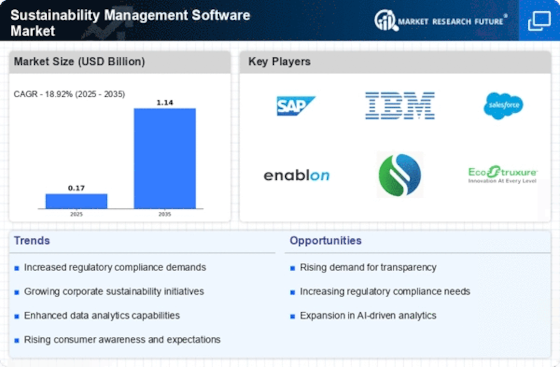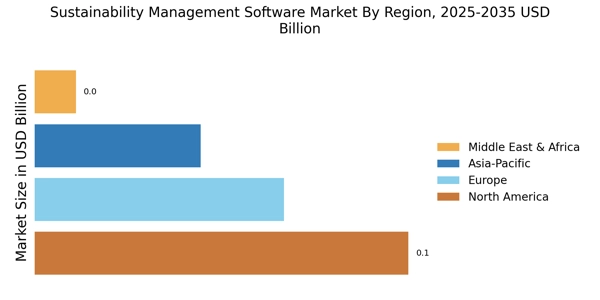Rising Demand for Transparency
The Sustainability Management Software Market is experiencing a notable increase in demand for transparency among organizations. Stakeholders, including consumers and investors, are increasingly seeking detailed insights into corporate sustainability practices. This trend is driven by a growing awareness of environmental issues and the need for companies to demonstrate accountability. As a result, organizations are adopting sustainability management software to track and report their environmental impact effectively. According to recent data, companies utilizing such software have reported a 30% improvement in their sustainability reporting accuracy. This heightened demand for transparency is likely to propel the growth of the Sustainability Management Software Market in the coming years.
Investment in Sustainable Practices
The Sustainability Management Software Market is witnessing a surge in investment directed towards sustainable practices. Organizations are increasingly allocating resources to implement sustainability initiatives, driven by both regulatory pressures and consumer expectations. Recent statistics reveal that companies investing in sustainability report a 25% reduction in operational costs over time. This financial incentive, coupled with the desire to enhance brand image, is propelling the adoption of sustainability management software. As businesses strive to optimize their sustainability efforts, the market for such software is poised for substantial growth. The increasing investment in sustainable practices is likely to be a key driver for the Sustainability Management Software Market.
Growing Consumer Awareness and Preferences
The Sustainability Management Software Market is significantly impacted by the growing consumer awareness and preferences for sustainable products and practices. As consumers become more environmentally conscious, they are increasingly favoring brands that demonstrate a commitment to sustainability. This shift in consumer behavior is prompting companies to adopt sustainability management software to align their operations with market expectations. Data shows that brands perceived as sustainable can command a price premium of up to 15%. This consumer-driven demand for sustainability is likely to catalyze the growth of the Sustainability Management Software Market, as businesses strive to meet evolving consumer preferences.
Corporate Social Responsibility Initiatives
The Sustainability Management Software Market is significantly influenced by the rise of corporate social responsibility (CSR) initiatives. Companies are increasingly recognizing the importance of integrating sustainability into their core business strategies. This shift is not merely a trend but a strategic necessity, as organizations aim to enhance their brand reputation and customer loyalty. Data indicates that firms with robust CSR programs experience a 20% increase in customer retention rates. Consequently, the demand for sustainability management software is expected to surge as businesses seek tools to measure, manage, and report their CSR efforts effectively. This growing emphasis on CSR is likely to drive the expansion of the Sustainability Management Software Market.
Technological Advancements in Data Analytics
The Sustainability Management Software Market is being transformed by technological advancements in data analytics. The integration of sophisticated analytics tools enables organizations to gather, analyze, and interpret vast amounts of sustainability-related data. This capability allows for more informed decision-making and strategic planning. As companies seek to enhance their sustainability performance, the demand for software that incorporates advanced data analytics is on the rise. Recent findings suggest that organizations utilizing data-driven insights can achieve a 40% improvement in their sustainability outcomes. This trend indicates that technological advancements will continue to play a pivotal role in shaping the Sustainability Management Software Market.

















